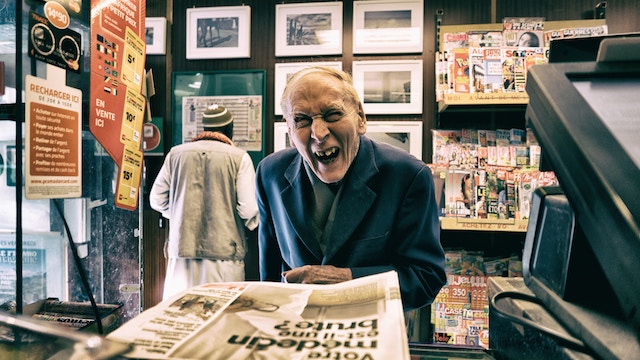Unlock the Magic in Your Story Now
Get the Free 20 questions to Ask Before Launching Your Idea workbook when you sign up for occasional updates.
Get the Free 20 questions to Ask Before Launching Your Idea workbook when you sign up for occasional updates.
Gap Bridging

Every non-fiction book title in the book store makes a promise to a prospective reader.
The author promises to bridge a gap in the reader’s knowledge, skills or abilities.
The reader believes they will be changed by the time they turn the last page.
Your audience is also asking you to make and fulfil promises.
What gap does your product or service help your audience to bridge?
Who are you promising your audience you can help them to become?
Image by Michal Balog
Share this article
Needs And Wants
filed in Meaningful Work, Strategy, Success

As creators, marketers and salespeople, we are, quite rightly, used to obsessing about our ideal client’s needs and wants.
After all, if we don’t understand what the people we care about serving care about, we’re unlikely to get the opportunity to serve them.
But if we are to do our best work, we must also be intentional about the kind of business and life we want to build. We often default to prioritising our needs while neglecting our wants.
What do you care about?
What kind of work serves you?
What do you need?
What do you want?
Image by Alice Achterhof
Share this article
A Question Of Choices
filed in Meaningful Work, Strategy, Success

What makes you the best choice for the people you want to serve?
What makes these people the best choice for you?
What stories do you choose to tell your right people about the value you create?
What stories do your right people choose to believe about the value you deliver?
What choices do you make every day about how to build your right business?
How do those choices help you to earn the trust of the right people?
Our choices not only determine our priorities, plans and results—they are also clues about what matters to us.
Image by Maarten van den Heuvel
Share this article
The Daily Opportunity
filed in Meaningful Work, Strategy, Success

We tend to think of opportunities as make or break moments. Those once in a lifetime happenings that could have accelerated our dreams if only we’d grabbed them before they passed us by.
But meaningful progress doesn’t happen in a single, magical alignment of the stars.
Opportunity can’t pass us by because it’s available to us in this moment and the next one.
The stars align when we show up every day to make the most of the opportunity that’s right in front of us.
Image by Jeff Sullivan
Share this article
By Heart Vs. With Heart
filed in Meaningful Work, Success, Worldview

When we were taught poetry in primary school, my classmates and I were encouraged to learn verses by heart. The teacher would call upon us during a lesson to stand and recite a poem or a verse.
This was how we learned the words that were written without understanding the depth of their meaning. We knew the poems by heart, but we didn’t know what to make of them or why they should matter to us because we never learned to say them with heart.
We have the opportunity every day to work by heart or to choose to do it with heart.
The more often we choose the latter the better for all of us.
Image by Josh Applegate
Share this article
People Want Places, Not Platforms
filed in Innovation, Meaningful Work, Success

Do you see all those people who whipping their smartphones out as soon as they get on the train or stand in a queue? They’re not just avoiding boredom, they’re searching—but not only for information, or laughs, or updates. They are searching for a feeling of connection.
We want places to go and places to be. Places to kill time and places that make us feel a little less lonely in the moment. Places to learn. Places to share. Places that make us feel safe, or smart, or welcomed, or funny, or hopeful for the future. But most of all, we want places to belong and places where we feel like we matter.
Those places used to be our family homes, our dinner tables at 6 pm, or football games with friends on Saturday afternoons. Increasingly they are digital spaces.
Whatever you’re building, think beyond features, functionality and design and think first about how the person you serve wants to feel when she arrives at the place you’ve built.
Image by Hugh Han
Share this article
Growing Small
filed in Meaningful Work, Success, Worldview

I remember landing my first ‘real’ job like it was yesterday.
One of the big British supermarket chains was opening a huge store not far from where I lived in Dublin. It was good news for the hundreds of people who would be employed there—more jobs, more choice for consumers—a win-win.
At fifteen, I thought I would get a weekend job on the checkouts, but instead, I was given the title, Stock Control Assistant, a navy blue uniform, and a clipboard. My job was to ‘assist’ the stock controller—a man wearing a red blazer, with a bigger clipboard, to record how much produce had been sold in the past week. The Stock Control Assistants met at eight o’clock every Saturday in the draughty warehouse before being assigned a section to record. The unlucky ones were assigned to frozen foods—not much fun in Dublin winters.
By nine, I’d find myself scaling shelves in the warehouse, crawling over pallets of baked beans and instant soups, counting every single packet and can. After lunch, we’d move into the store to count the items on the shelves. We were under strict instructions to stay on task and not to ‘serve’ customers while we were on the shop floor. That was somebody else’s job.
I’d kneel on the floor in front of the macaroni cheese so I could see right to the back of the shelf, making sure I was recording the right number. Then a shopper would reach over me, take a can, and pop it in his basket.
Two weeks in I realised our job was futile. However accurate we tried to be, we’d never get the numbers right. But the part of the job that mystified me more was the instructions about leaving customers to their own devices. How could we ignore the elderly lady who was struggling to reach a jar of beetroot on the top shelf? Surely well-stocked shelves and low prices weren’t enough to keep customers coming back?
What I’d witnessed about how to build a business growing up in the suburbs was the opposite of this. My mother’s butcher knew her by name and her order by heart. The grocer stopped and chatted to her for what seemed like an eternity to us kids waiting to pay and get home to play. The baker would make sure he only sold her the freshest bread. None of these small business owners won by having the most stock. They won by taking the most care.
As you’ve probably guessed, I didn’t last long in the giant supermarket. The salary and subsidised lunches weren’t enough to keep me there. They didn’t feed my soul.
The big store lives on today. But it’s not as popular as it was in those early days when it first opened. And the supermarket chain is changing its strategy. Like many retailers, they are opening smaller, local stores to cut costs. Going small is the new growth strategy. It looks like we are circling back to a time of more care and connection. I believe that’s what our customers (and we) want.
Image by Johann Walter Bantz
Share this article
Looking For Someone
filed in Marketing, Strategy, Success

One day, maybe today—you will get an email enquiry or a call from a person who says they are ‘looking for someone’ who does what you do, to help them to achieve their goals.
You will be tasked with convincing this person you are the right ‘someone’ for the job.
You will need to find the right words and price to make them pick you above the other options they are considering.
Imagine how much better your story and your work would be if you weren’t aiming to convince everyone.
How can you become the one for the people you want to matter to?
Image by Brandon Lopez
Share this article
Like The Weather
filed in Success

The weather is a favourite preoccupation of many people in the city where I was born.
‘Lovely day!’ Someone might say.
‘Looks like it might rain later, though.’ Comes the reply.
We’re all guilty of obsessing over the one thing we can’t control.
We can always blame the weather if the gathering we’d planned doesn’t go as we’d hoped.
But often the thing we can’t control distracts us, getting in the way of the things we can affect or change.
We can choose to be wet and miserable or we can wear wellies and pack an umbrella.
Image by Neon Brand
